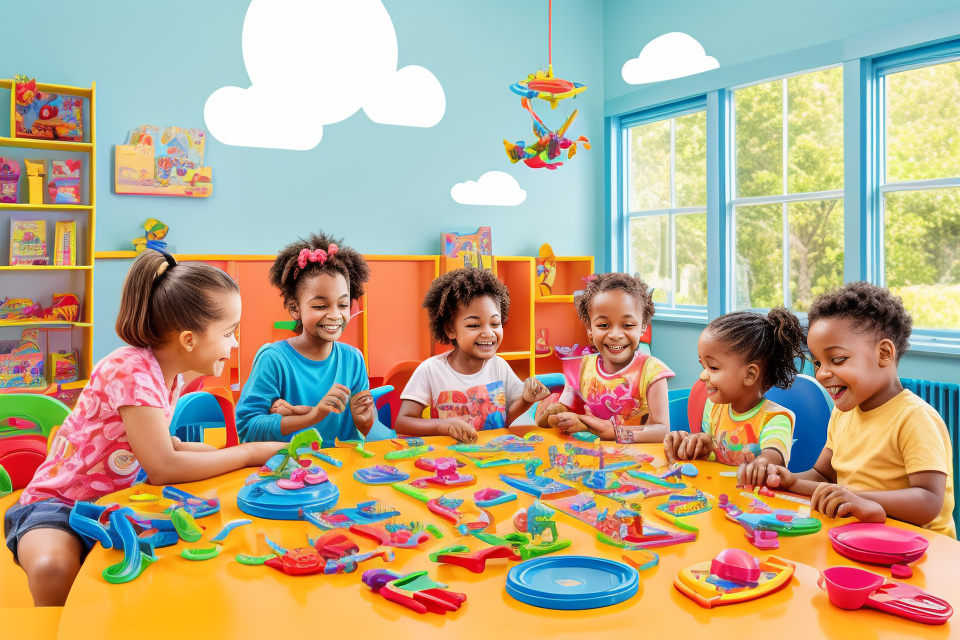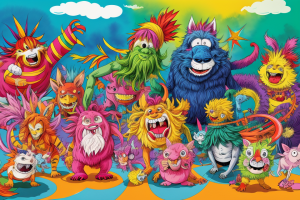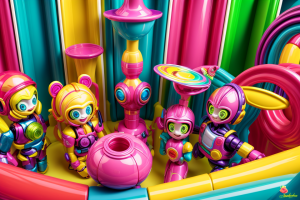
Competition can be a double-edged sword. On one hand, it can bring out the worst in people, fostering aggression and selfishness. On the other hand, it can be a powerful tool for growth and development, especially for children. Toy competitions, in particular, can offer a wealth of benefits for kids, helping them to develop important life skills and build confidence. In this article, we’ll explore the advantages of childhood competition, and why toy competitions can be a great way to help kids reach their full potential. So, buckle up and get ready to discover why competition can be good for kids!
The Importance of Play in Child Development
The Role of Play in Cognitive Development
Play is a crucial aspect of a child’s life, as it allows them to explore, discover, and learn about the world around them. In the context of cognitive development, play is a powerful tool that helps children to build and refine their cognitive abilities.
One of the primary ways in which play contributes to cognitive development is by providing opportunities for children to engage in problem-solving. Through play, children are presented with challenges that require them to think creatively and come up with solutions. This process helps to develop their ability to reason, plan, and solve problems, all of which are critical skills for success in adulthood.
Another important way in which play supports cognitive development is by fostering the development of language and communication skills. Through play, children engage in conversations, role-playing, and storytelling, all of which help to develop their verbal and nonverbal communication skills. This, in turn, helps children to better understand and express their thoughts and ideas, which is essential for academic and social success.
In addition to promoting problem-solving and communication skills, play also supports the development of memory and attention. Through play, children are exposed to new information and experiences, which helps to strengthen their memory and enhance their ability to focus and pay attention. This, in turn, supports the development of cognitive control, which is the ability to direct one’s attention towards a specific task and ignore distractions.
Overall, the role of play in cognitive development is significant and far-reaching. By providing children with opportunities to engage in problem-solving, language and communication, and memory and attention, play helps to build a strong foundation for future academic and social success.
The Role of Play in Emotional Development
Play is a crucial aspect of a child’s development, as it helps them understand and navigate their emotions. Through play, children learn to recognize and express their feelings, which is an essential part of emotional intelligence. In addition, play provides a safe space for children to experiment with different emotions and learn how to manage them.
One of the main benefits of play in emotional development is that it allows children to practice and develop social skills. Through play, children learn how to communicate, cooperate, and empathize with others. They also learn how to negotiate and resolve conflicts, which are important skills for building positive relationships with others.
Another benefit of play in emotional development is that it helps children build self-esteem and confidence. When children engage in activities that they enjoy and are good at, they experience a sense of accomplishment and pride. This can help boost their self-esteem and encourage them to try new things and take on new challenges.
Furthermore, play provides an outlet for creativity and imagination, which can help children express themselves in unique and imaginative ways. This can be especially beneficial for children who may struggle to express their emotions through more traditional means, such as talking or writing.
Overall, the role of play in emotional development is significant, and it is essential to provide children with opportunities to engage in play and explore their emotions in a safe and supportive environment.
The Role of Play in Social Development
Play is a vital component of child development, and it plays a crucial role in promoting social development. Through play, children learn how to interact with others, develop social skills, and build relationships. Here are some ways in which play contributes to social development:
Building Social Skills
Play helps children develop important social skills such as communication, cooperation, and empathy. When children engage in imaginative play, they practice using language to express their thoughts and feelings, negotiate roles and rules, and resolve conflicts. These skills are essential for forming healthy relationships and functioning effectively in social situations.
Developing Emotional Intelligence
Play also helps children develop emotional intelligence, which is the ability to recognize, understand, and manage their own emotions and the emotions of others. Through play, children learn to identify and express their own emotions, as well as empathize with the feelings of others. This emotional intelligence is critical for building positive relationships and managing conflicts.
Enhancing Creative Thinking
Play fosters creativity and creative thinking, which are essential for problem-solving and innovation. When children engage in imaginative play, they learn to think outside the box, generate new ideas, and explore alternative solutions. These skills are crucial for success in school and in life.
Promoting Social Inclusion
Finally, play promotes social inclusion by providing opportunities for children to interact with others from diverse backgrounds and cultures. Through play, children learn to appreciate and respect differences, challenge stereotypes, and build friendships with children who may be different from themselves. This social inclusion is essential for fostering a sense of belonging and community.
In conclusion, play is a powerful tool for promoting social development in children. By engaging in play, children learn important social skills, develop emotional intelligence, enhance creative thinking, and promote social inclusion. Therefore, it is important to encourage children to engage in play, particularly through toy competitions, as it provides them with opportunities to develop these important skills.
Benefits of Toy Competitions for Kids
Developing Competitive Skills
Competition is an integral part of life, and children who learn to compete early on are better equipped to handle the challenges that come with growing up. Toy competitions provide a safe and controlled environment for children to develop their competitive skills. Here are some ways in which toy competitions help kids develop competitive skills:
- Learning to accept defeat: Losing is a natural part of competition, and toy competitions provide an opportunity for children to learn how to handle defeat gracefully. By learning to accept defeat, children develop resilience and learn to bounce back from setbacks.
- Developing sportsmanship: Sportsmanship is an important aspect of competition, and toy competitions provide an opportunity for children to learn the importance of good sportsmanship. Children learn to respect their opponents, congratulate them on their wins, and treat others with kindness, regardless of the outcome of the competition.
- Building self-confidence: Winning can be a great boost to a child’s self-confidence, but toy competitions also provide opportunities for children to build self-confidence even when they lose. By participating in toy competitions, children learn to take risks, try new things, and push themselves out of their comfort zones. This helps them develop self-confidence and a sense of accomplishment.
- Developing strategic thinking: Toy competitions require children to think strategically and make decisions on the fly. This helps them develop problem-solving skills and the ability to think critically. Children learn to analyze situations, anticipate their opponents’ moves, and come up with creative solutions to challenges.
- Improving social skills: Toy competitions provide opportunities for children to interact with others, make friends, and develop social skills. Children learn to communicate effectively, cooperate with others, and work as a team. They also learn to understand different perspectives and appreciate diversity.
Overall, toy competitions provide children with a safe and controlled environment to develop their competitive skills. Through competition, children learn valuable life skills such as sportsmanship, self-confidence, strategic thinking, and social skills. These skills help children succeed in all areas of life and prepare them for the challenges that come with growing up.
Enhancing Problem-Solving Abilities
Competitions can provide kids with a platform to showcase their skills and knowledge, which can be beneficial in developing their problem-solving abilities. Through participation in toy competitions, children are exposed to various challenges that require them to think critically and creatively. This section will explore how toy competitions can enhance a child’s problem-solving abilities.
Building Confidence
Competitions can be a great way for kids to build their confidence. When children participate in toy competitions, they are often presented with challenges that require them to think outside the box. This can be a great opportunity for them to develop their problem-solving skills, as well as their confidence in their own abilities.
Developing Creativity
Toy competitions can also be a great way for kids to develop their creativity. When faced with a challenge, children may need to think of unique solutions that they may not have considered before. This can help them to develop their creative thinking skills, which can be beneficial in many areas of life.
Learning from Failure
Participating in toy competitions can also teach children important lessons about failure. When children are presented with challenges, they may not always succeed in solving them. However, this can be a valuable learning experience, as it teaches children that failure is a natural part of the learning process. By learning from their failures, children can develop resilience and perseverance, which are important qualities for success in any area of life.
Finally, toy competitions can also help children to build their social skills. When children participate in competitions, they are often working in teams or interacting with other children. This can help them to develop important social skills, such as communication, collaboration, and cooperation. These skills can be beneficial in many areas of life, including in school and in future careers.
Overall, toy competitions can be a great way for kids to enhance their problem-solving abilities. By participating in these competitions, children can build their confidence, develop their creativity, learn from failure, and build important social skills.
Fostering Creativity and Imagination
Toy competitions offer children the opportunity to showcase their creativity and imagination, as they engage in play that involves imaginative thinking and problem-solving. By participating in these competitions, kids can develop their creative abilities and explore new ideas.
Encouraging Open-Ended Play
Toy competitions often involve open-ended play, where children are given the freedom to create and experiment with toys and games without a set outcome or goal. This type of play encourages children to think outside the box and come up with unique solutions to problems.
Building Confidence in Creativity
When children participate in toy competitions, they are often judged on their creativity and originality. This feedback helps to build their confidence in their own abilities and encourages them to continue exploring their creative side.
Learning from Others
In addition to building confidence, toy competitions also provide children with the opportunity to learn from others. They can observe how other children approach problems and find creative solutions, which can inspire their own thinking and help them develop new ideas.
Boosting Self-Esteem
Overall, participating in toy competitions can boost children’s self-esteem and confidence in their own abilities. When they are recognized for their creativity and imagination, they feel valued and appreciated, which can help to build their self-worth and encourage them to continue exploring their creative side.
Building Self-Confidence and Self-Esteem
Competition can play a crucial role in helping children build self-confidence and self-esteem. Through participation in toy competitions, kids can develop a sense of accomplishment and pride in their abilities. This, in turn, can boost their overall self-confidence and self-esteem, leading to a more positive outlook on life and a greater sense of self-worth.
Here are some of the ways in which toy competitions can help build self-confidence and self-esteem in children:
- Achievement and Recognition: By participating in toy competitions, children have the opportunity to achieve something and receive recognition for their efforts. This recognition can help them feel valued and appreciated, which can contribute to a sense of self-worth and confidence.
- Personal Growth and Development: Competing in toy competitions can also help children see their own personal growth and development. As they work towards a goal, they can track their progress and see how they improve over time. This can be a powerful motivator for children, as it helps them see that their hard work and effort can lead to tangible results.
- Comparing and Contrasting Skills: Toy competitions provide children with the opportunity to compare and contrast their skills with those of their peers. This can help them gain a better understanding of their own strengths and weaknesses, as well as identify areas for improvement. Additionally, it can also help them appreciate the unique talents and abilities of others, fostering a sense of community and camaraderie among competitors.
- Handling Win and Loss: Toy competitions can also help children learn how to handle both win and loss situations. When they win, it can boost their confidence and self-esteem, while losing can provide them with valuable lessons on how to cope with disappointment and failure. By learning how to handle both situations, children can develop a more balanced and resilient sense of self.
Overall, toy competitions can provide children with a safe and supportive environment in which to develop their self-confidence and self-esteem. By engaging in these activities, children can learn valuable life skills, build positive relationships with others, and develop a strong sense of self-worth.
Encouraging Teamwork and Cooperation
Toy competitions can provide a valuable opportunity for children to develop their teamwork and cooperation skills. Through participating in these competitions, kids can learn how to work together towards a common goal, communicate effectively, and support one another in achieving success.
One way that toy competitions encourage teamwork is by requiring children to work together to build or create their toys. This process can help them learn how to share ideas, delegate tasks, and collaborate towards a shared objective. They may also learn how to communicate effectively with one another, expressing their thoughts and ideas in a clear and concise manner.
Additionally, toy competitions can help children develop their empathy and understanding of others’ perspectives. By working together towards a common goal, kids can learn how to appreciate and respect the contributions of their teammates, and understand how their own actions can impact the success of the team as a whole.
Overall, the benefits of encouraging teamwork and cooperation through toy competitions can help children develop important social and emotional skills that will serve them well throughout their lives.
Preparing Kids for Future Success
Lessons in Resilience and Adaptability
Competition is a valuable learning experience for children, as it provides them with the opportunity to develop important life skills such as resilience and adaptability. In the fast-paced and ever-changing world we live in, these skills are more important than ever before.
Building Resilience
Competing in toy competitions helps children build resilience, a critical skill for navigating life’s challenges. When children face defeat or disappointment, they learn to bounce back, persevere, and keep moving forward. Resilience is developed through overcoming obstacles, learning from mistakes, and experiencing setbacks. Toy competitions offer a safe and supportive environment for children to practice these important life lessons.
Developing Adaptability
Competitions also help children develop adaptability, which is the ability to adjust to new situations and environments. Adaptability is essential for success in both personal and professional life, as it allows individuals to thrive in diverse environments and handle unexpected changes. In toy competitions, children must quickly adapt to different scenarios, such as new rules, game strategies, and even the unpredictable behavior of their opponents. This experience helps them develop a flexible mindset and enhances their problem-solving skills.
Importance of Failure
In competition, failure is an inevitable part of the learning process. Children must learn to accept and learn from their failures, as it is through these experiences that they develop resilience and adaptability. Toy competitions provide a platform for children to experience failure in a controlled environment, allowing them to learn from their mistakes and grow as individuals. By learning to cope with failure, children can develop the mental fortitude necessary to face future challenges with confidence and determination.
Emotional Intelligence
Resilience and adaptability are closely linked to emotional intelligence, a crucial aspect of personal and professional success. Emotional intelligence enables individuals to understand, manage, and express their emotions effectively. Through competition, children learn to regulate their emotions, develop empathy, and build positive relationships with others. These skills contribute to their overall emotional intelligence, helping them navigate the complex social landscape of life.
Encouraging a Growth Mindset
Finally, competitions help foster a growth mindset in children. A growth mindset is the belief that abilities and intelligence can be developed through dedication, hard work, and perseverance. This mindset is essential for success, as it encourages children to embrace challenges, learn from failures, and continually strive for improvement. Toy competitions provide an ideal setting for children to develop a growth mindset, as they can witness their own progress and the impact of their efforts on their performance.
In conclusion, toy competitions offer a valuable learning experience for children, helping them develop important life skills such as resilience, adaptability, emotional intelligence, and a growth mindset. These skills prepare children for future success, equipping them with the tools they need to navigate life’s challenges and thrive in an ever-changing world.
Developing Leadership Potential
Competitions can provide kids with opportunities to develop their leadership skills. Here are some ways that toy competitions can help in this regard:
- Encouraging Self-Confidence: When children participate in toy competitions, they often have to present their ideas or creations to a judge or audience. This experience can help them develop self-confidence and the ability to speak in public.
- Developing Problem-Solving Skills: During a toy competition, children may encounter various challenges that require them to think creatively and come up with solutions on the spot. This can help them develop their problem-solving skills, which are essential for future success.
- Learning to Work as a Team: Toy competitions often involve teamwork, whether it’s working together to build a toy or collaborating on a design. This experience can help children learn how to work effectively with others, a crucial skill for success in any field.
- Building Resilience: When children participate in competitions, they are likely to face setbacks and challenges. However, learning to bounce back from these experiences can help them build resilience, a key trait for future success.
- Developing a Winning Mindset: Finally, toy competitions can help children develop a winning mindset, where they learn to set goals, work hard, and persist in the face of challenges. This mindset can be a powerful force for success in any area of life.
Enhancing Communication and Interpersonal Skills
Competitions can be an excellent platform for children to develop their communication and interpersonal skills. By participating in toy competitions, kids can learn how to effectively interact with others, build relationships, and collaborate with their peers.
Here are some ways in which toy competitions can enhance children’s communication and interpersonal skills:
Active Listening
Through active listening, children can develop their ability to understand and respond to others. During toy competitions, kids can practice their listening skills by paying attention to their opponents’ strategies, identifying weaknesses, and anticipating their moves. This can help them build empathy and improve their understanding of others’ perspectives.
Expressing Thoughts and Ideas
Competitions provide an opportunity for children to express their thoughts and ideas in a structured environment. Kids can learn how to articulate their thoughts, present their arguments, and negotiate with their peers. By participating in discussions and making decisions, children can enhance their confidence in expressing themselves and learn how to advocate for their beliefs.
Building Relationships
Competitions offer a unique opportunity for children to build relationships with their peers. By interacting with others in a friendly yet competitive environment, kids can learn how to make friends, respect others’ opinions, and work collaboratively. Through these interactions, children can develop their social skills and learn how to cooperate and negotiate with others.
Collaboration and Teamwork
Toy competitions can also foster collaboration and teamwork among children. By working together towards a common goal, kids can learn how to share ideas, divide tasks, and support each other. This can help them develop their problem-solving skills, learn how to work in a team, and appreciate the value of diversity and inclusion.
In conclusion, toy competitions can play a significant role in enhancing children’s communication and interpersonal skills. By providing a platform for active listening, expressing thoughts and ideas, building relationships, and collaborating with others, children can develop essential life skills that will serve them well in their future endeavors.
Creating a Lifelong Love for Learning
Competition in toy-based activities can instill a passion for learning in children that will stay with them throughout their lives. By engaging in these competitions, kids are encouraged to explore new ideas, experiment with different approaches, and develop problem-solving skills that they can apply in various aspects of their lives. Here are some ways in which toy competitions can foster a lifelong love for learning:
- Encouraging curiosity and exploration: Toy competitions provide a platform for children to discover new interests and explore their creativity. As they participate in different activities, they are encouraged to ask questions, seek answers, and experiment with different approaches. This curiosity and desire to learn can lead to a lifelong love for learning and a willingness to embrace new challenges.
- Developing problem-solving skills: Competitions often involve challenges and obstacles that require children to think critically and creatively. By engaging in these activities, kids learn how to analyze situations, identify problems, and develop strategies to overcome them. These skills are invaluable in all areas of life and can help children develop a love for learning that extends beyond the competition arena.
- Building self-confidence: Success in toy competitions can boost children’s self-confidence and self-esteem. As they achieve their goals and overcome obstacles, they learn to believe in themselves and their abilities. This confidence can translate into other areas of their lives, inspiring them to take on new challenges and embrace learning opportunities with enthusiasm.
- Nurturing a growth mindset: Toy competitions can help children develop a growth mindset, the belief that their abilities can be developed through dedication and hard work. As they see their own progress and improvement, they learn that effort and perseverance lead to success. This mindset can foster a lifelong love for learning, as children embrace challenges and see setbacks as opportunities for growth.
- Encouraging teamwork and collaboration: Many toy competitions involve teamwork and collaboration, helping children learn to work effectively with others. By sharing ideas, dividing tasks, and supporting one another, children develop essential social and communication skills. These experiences can help them appreciate the value of teamwork and collaboration in all areas of life, inspiring a lifelong love for learning that involves working with others towards common goals.
The Power of Childhood Competition: Shaping Tomorrow’s Leaders Today
Childhood competition plays a crucial role in shaping the future leaders of tomorrow. It is through these early experiences that children learn important life skills such as resilience, perseverance, and problem-solving. In addition, toy competitions provide children with the opportunity to develop their social skills, such as teamwork and communication, which are essential for success in any field.
The Importance of Resilience and Perseverance
Resilience and perseverance are two of the most important qualities that a leader can possess. Childhood competition helps children develop these qualities by exposing them to challenges and setbacks that they must overcome in order to succeed. Through this process, children learn to bounce back from failure, persist in the face of adversity, and maintain a positive attitude even when things don’t go as planned.
Problem-Solving Skills
Toy competitions also provide children with the opportunity to develop their problem-solving skills. Whether it’s strategizing how to build the best toy or working together to overcome obstacles, children are constantly challenged to think creatively and come up with innovative solutions. These skills are essential for success in any field, whether it’s business, science, or the arts.
The Importance of Social Skills
Finally, toy competitions provide children with the opportunity to develop their social skills, such as teamwork and communication. When children work together to build a toy, they must communicate effectively, listen to each other’s ideas, and compromise when necessary. These skills are essential for success in any field, and they provide children with a foundation for building strong relationships and working effectively with others.
In conclusion, childhood competition is a powerful tool for shaping tomorrow’s leaders. Through toy competitions, children learn important life skills such as resilience, perseverance, problem-solving, and social skills, which are essential for success in any field. By participating in these competitions, children are prepared for the challenges and opportunities that lie ahead, and they are equipped with the skills and knowledge they need to become the leaders of tomorrow.
FAQs
1. What is the importance of competition in a child’s life?
Competition helps children develop important life skills such as self-discipline, self-motivation, and self-confidence. Through participating in competitions, kids learn to set goals, take calculated risks, and cope with both victory and defeat. These experiences can shape them into well-rounded individuals who are capable of navigating the challenges of life.
2. Is competition healthy for children?
Yes, when approached in a healthy and balanced manner, competition can be very beneficial for children. It helps them learn to appreciate the value of hard work, discipline, and dedication. Additionally, it teaches them how to cope with pressure, handle success and failure, and respect the achievements of others.
3. How does competition help children grow socially?
Competition allows children to interact with others, build friendships, and learn how to cooperate and collaborate with their peers. They learn to respect the opinions of others, develop empathy, and understand the importance of teamwork. All these qualities are essential for their personal and professional growth in the future.
4. What are the benefits of toy competitions for kids?
Toy competitions can help children develop their creativity, imagination, and problem-solving skills. They encourage children to think out of the box, explore new ideas, and challenge themselves. These competitions also provide a platform for children to showcase their talents and abilities, which can boost their confidence and self-esteem.
5. Are there any negative effects of competition on children?
Excessive competition can have negative effects on children, such as increased stress and anxiety, a fear of failure, and a diminished sense of self-worth. It is important to ensure that children participate in a healthy and balanced competition environment that emphasizes personal growth and enjoyment, rather than just winning at all costs.







